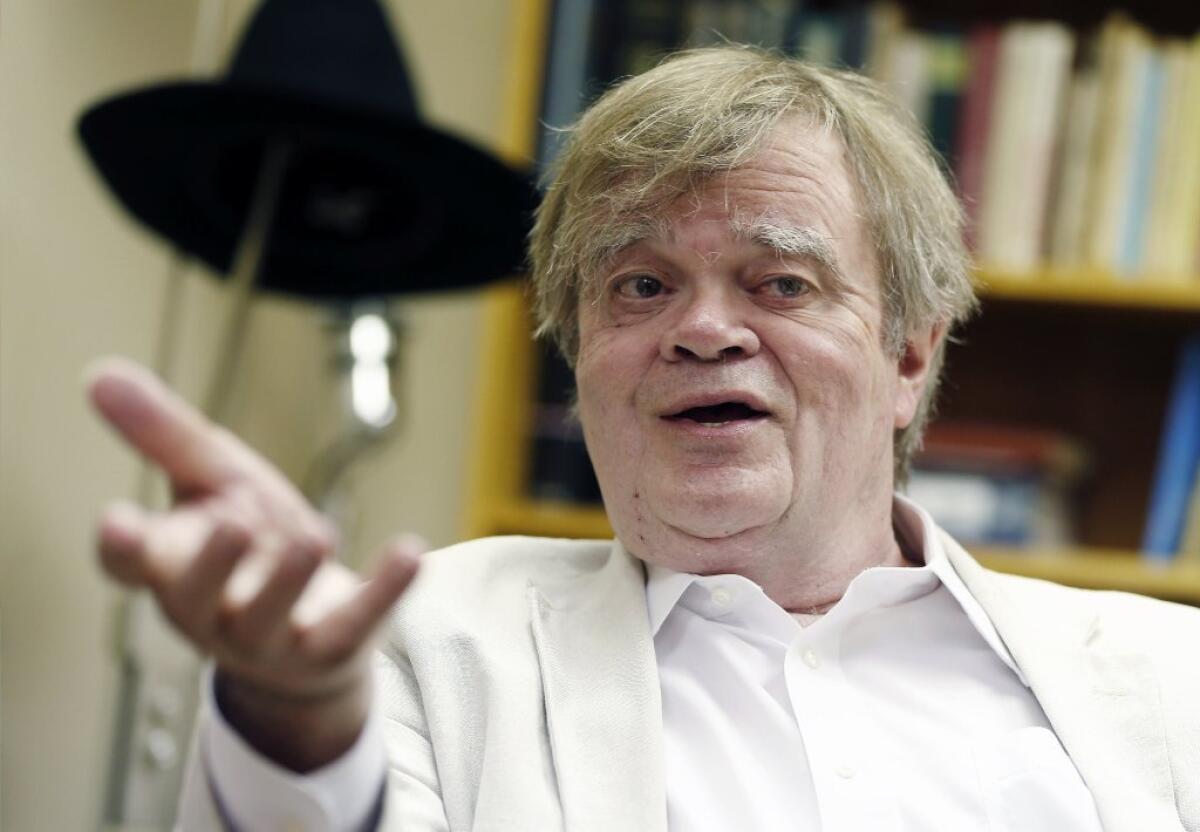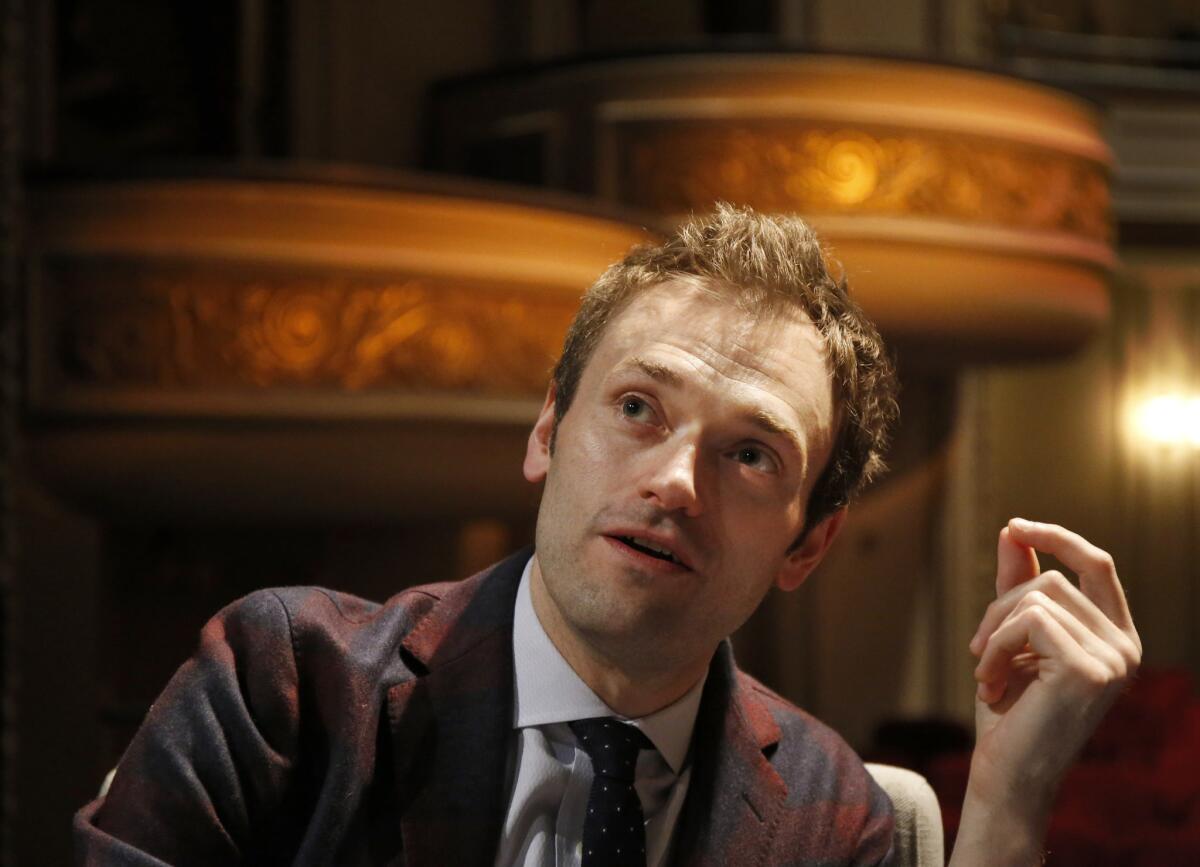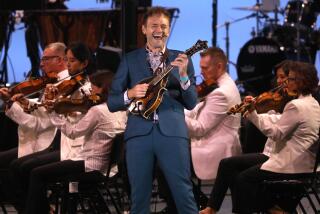In defense of Garrison Keillor: His polarizing ‘Prairie Home Companion’ ends this weekend... in Hollywood

- Share via
Garrison Keillor means it this time. On Friday at the Hollywood Bowl, he will tape his last show as host of “A Prairie Home Companion,” the public-radio institution he created and has led, with relatively brief interruptions since 1974; the next day, Saturday, it will be broadcast to the rest of the listening land.
Keillor, 73, had left the series once before, when he married and moved to Denmark in the late 1980s, closing the shop entirely. But by 1993, after a detour through New York and “The American Radio Company of the Air,” he made his way back to “Prairie” and the Fitzgerald Theater in St. Paul; they have been in business ever since. A stroke in 2009 hardly broke his stride. (He suffered a seizure during Memorial Day weekend this year, his second this year). For a few months in 2011, as 70 appeared on his horizon, he seemed to be serious about leaving again, but he stayed the course. He kept on keeping on.
But now a new host has been hired, mandolin player Chris Thile, 35, of Nickel Creek and the Punch Brothers, whose own history with the show runs back 20 years. Thile will begin his run in October. (His Nickel Creek bandmate, Sara Watkins, also a series favorite, will be on the bill at the Bowl.)

Keillor and his show have their fans – a weekly audience of more than 3 million currently — and their detractors, some of whom strive to separate their dislike of the creator from their liking of his creation. Some find his voice, which has acquired a late-period breathlessness alongside an oak-cask richness, like nails on a chalkboard. For some it is too white, too Midwestern, too old – the median listener is 59, according to Nielsen. For some that’s reason enough to dismiss it.
I have had my own ups and downs with “Prairie,” but I have come to feel they were generally of my own making, a reflection of my own temper at the time rather than the quality of the thing itself, which is generally high. I was aware of the product before the show, of the stacked paperbacks and cassette tapes that somehow seemed to occupy every sight line in the brick-and-mortar bookshops of yore. My reflexive first impulse, based on the packaging and the placement, was to distrust it as straightforward, cinnamon-scented sentimentality, like a year-round Christmas store.
I was mistaken. The occasional old hymn notwithstanding, it is ironic and twisty and not a little devilish.
Like his contemporary and fellow Minnesotan Bob Dylan, born a year earlier some three hours’ drive to the north, Keillor has a dark temperament lighted by a puckish humor and in his work mixes the spiritual and the sensual, the moral and the mortal. “A Prairie Home Companion” is on its surface very bright, punctuated with laughter and applause and the metallic flash of guitar and fiddle and piano strings – “good-time music,” as much of it might generically be called. But it masks a kind of amused fatalism.
Consider Beebopareebop Rhubarb Pie (“Nothing gets the taste of shame and humiliation out of your mouth quite like Beebopareebop Rhubarb Pie”) or the Ketchup Advisory Board, which promotes the condiment, with its “natural mellowing agents” as a kind of mood elevator, while Powdermilk Biscuits “give shy persons the strength to get up and do what needs to be done.”

Populated with characters not from Keillor’s own small-town youth but from the world of his parents, their siblings and their friends, Lake Wobegon – the fictional subject of Keillor’s weekly monologue – is on the face of it old-fashioned: a needlepoint sampler created in the year of “Chinatown,” “The Texas Chainsaw Massacre,” Kraftwerk’s “Autobahn,” and the Ramones’ first public appearance.
But you would be wrong to regard it as nostalgia, even as age and the old days have inevitably run to the forefront of Keillor’s thoughts. It’s Keillor’s Sherwood Anderson’s Winesburg, Ohio, or William Saroyan’s Ithaca, Calif., an ordinarily eccentric small town big enough to contain all life’s joys and sorrows and, despite its sheen of Protestant, passive-aggressive politeness, a multitude of sins.
“The challenge of humor,” Keillor has said, is that “somehow it must comprehend darkness and death.” Fatality as well as fatalism is built into the series; people die, or almost die, and so remember to live. In Robert Altman’s 2006 lovely, last film, “A Prairie Home Companion,” Death (played by Virginia Madsen) is a character, roaming the corridors and the stage of the Fitzgerald Theater as the series itself is about to expire. It is not meant tragically.
‘A Prairie Home Companion’ has been an ark between the old world and the new, the analog and the digital. It kept audio comedy alive into an age of video.
— Robert Lloyd
Radio itself is old-fashioned, of course, and yet – between Web-based podcasting, satellite radio and mobile apps -- it is very much of the moment. Storytelling, which is the job inside Keillor’s bigger job, and one at which he casually excels, is the engine that drives “This American Life,” “Snap Judgment,” “StoryCorps” and “The Moth,” which awarded him its 2007 Moth Award. “Thank you for this,” he said accepting it. “I don’t believe in awards; or didn’t until very recently.”
The overall form of the show, an olio of songs, stories, skits and ads for invented products – invented because public radio carried no commercials – was inspired by Keillor’s reporting, for a 1974 New Yorker piece, on the last broadcast of “The Grand Ole Opry” from Nashville’s Ryman Auditorium, built in 1892, before its move to plush new digs at Opryland. “You listen to the Opry and pretty soon you have a place in mind… and eventually you have got to go and be there too,” Keillor wrote. “Closing my eyes, I could see the stage just as clearly as when I was a kid lying in front of our giant Zenith console.”
“I’m a radio man for thirty-some years,” Keillor wrote in his poem “Radio Man, “Doing an old variety show/Based on some I used to hear/When I was your age long ago./Critics pointed out my debts/To Bob & Ray and Fibber McGee/But alcohol and cigarettes/Swept those critics out to sea/And to twenty-year-olds who were born/Too late to hear the great Fred Allen/I’m the creator of the form,/Sailing the airwaves like Magellan.”
“A Prairie Home Companion” has been a sort of ark between the old world and the new, the analog and the digital. It kept audio comedy alive into an age of video – I bow down here to the flexible brilliance of company members Sue Scott and Tom Russell and to the sound-effects artistry of Fred Newman and Tom Keith, given a pride of place unmatched elsewhere.
Under Thile, the show, which will keep its name and time slot, is expected to be more music than comedy. Some old hands may remain, but when Keillor leaves, the show will also lose its head writer – its writer, basically – and whatever of the original remains will be an echo of that voice. He will have moved on, along with Guy Noir the private eye and Lefty the cowboy and an artist named Bob. If you want any more news from Lake Wobegon you will have to write it yourself.
As Keillor said to the 1990 graduates at Anoka High School, his alma mater, “Graduation is a graceful and sweet old ceremony. What it means is that it’s time to gather your stuff together and get out.”
“A Prairie Home Companion” with Garrison Keillor, featuring Christine DiGiallonardo, Sarah Jarosz, Heather Masse, Aoife O’Donovan and Sara Watkins. Hollywood Bowl, 2301 N Highland Ave. Friday, July 1. 8 p.m. $7-$164. (800) 745-3000 or www.ticketmaster.com
MORE:
Famed voice actress Janet Waldo provided the sound of sweetness, spiked with attitude
More to Read
The complete guide to home viewing
Get Screen Gab for everything about the TV shows and streaming movies everyone’s talking about.
You may occasionally receive promotional content from the Los Angeles Times.







